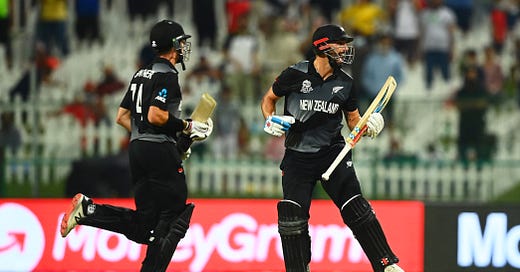WORLD T20 SPECIAL: Mitchell and Neesham blast away in desert stormer
Fine margins fall New Zealand's way as they book spot in another final.
Twenty20 cricket eh, bloody hell.
To sum up the sheer ridiculousness of the format, consider this: after 16 overs New Zealand had less than a 10 percent chance of winning; four legitimate deliveries later they were favourites.
Those four balls went six, two leg byes, four and six. Th…
Keep reading with a 7-day free trial
Subscribe to The Bounce to keep reading this post and get 7 days of free access to the full post archives.




